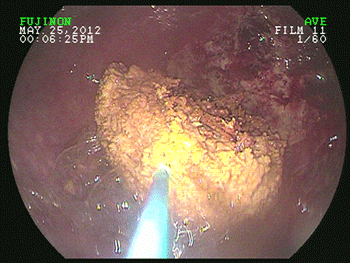When Emagine, a 5-year-old warmblood mare, began having dark urine after exercise, her owner, Ashley Anzulewicz, noticed right away. She called her veterinarian who gave antibiotics for a presumed urinary tract infection, a usual procedure for this type of problem, but after no improvement, Anzulewicz decided she needed a more thorough analysis.

Gainesville was a few hours’ drive from their home in Tampa, but the UF Large Animal Hospital was worth the drive to find out the problem and ensure that nothing Anzulewicz was doing would worsen it.
Emagine and Anzulewicz were greeted by Dr. Rob MacKay and Dr. Martha Mallicote of the UF Large Animal Medicine Service, who performed an exam and did blood work to look for muscle or kidney disease. The blood work showed no signs of organ dysfunction, so the doctors knew that the issue was most likely confined to the bladder or lower urinary tract. They performed rectal palpation and found an egg-sized stone in her bladder. (Read more about bladder stones in large animals.)
“We wanted to be sure there were no other complications, so we performed an abdominal ultrasound and endoscopy of the bladder, a procedure called a cystoscopy, in order to view the internal structures of the urinary tract,” Dr. MacKay said. “We didn’t find any other issues, so we needed to decide the best and least traumatic way to get rid of the bladder stone.”
Surgery through the urethra could result in incontinence, chronic urine scalding and impact the mare’s show and breeding career, so the veterinarians considered an alternative and uncommon technique called laser lithotripsy. Lithotripsy is a procedure that breaks up the stones within the bladder using a laser, and it can be done with just standing sedation.
Dr. Alex Gallagher, internal medicine specialist at the UF Small Animal Hospital, was performing the procedure in dogs and cats and had experience with it in horses during his residency, so he was brought onto the case for a consultation. He agreed that lithotripsy was a reasonable and good option for Emagine.
“There was only one large bladder stone, so using a laser was a perfect solution,” Dr. Mallicote said. “With Dr. Gallagher’s lithotripsy tools and expertise, the stone could be broken up from the inside, avoiding any invasive procedures.”

The procedure went well with no complications. Emagine stayed at the hospital for the following few days so that the veterinarians could perform bladder lavages with saline to eliminate stone fragments. They also watched for inflamed bladder tissue and any discomfort.
The follow-up care at the hospital went well, and Emagine was sent home on antibiotics and diet change recommendations. The veterinarians wanted Anzulewicz to stop feeding alfalfa because of the high calcium content which could contribute to the formation of stones, and switch to grass hay. They also recommended plenty of fresh water and salt to encourage water intake. The more hydrated Emagine remained, the less chance stones would form again.
Three months later at a follow-up appointment at UF, a urinalysis and cystoscopy were performed, and the veterinarians couldn’t have been happier with the results. No complications had occurred and no other stones had started to form.
Emagine later continued her show career and even seemed to have a different disposition since the lithotripsy.
“Ashley was so happy with the mare under saddle,” Dr. Mallicote said. “Emagine’s demeanor and attitude improved a lot and Ashley even said that they didn’t know she was such a good-natured mare. It was a simple procedure, but not widely performed, so we were very grateful that we had the tools and expertise. It’s rewarding seeing her back to work with a better attitude.”
View all UF Large Animal Hospital Success Stories.




